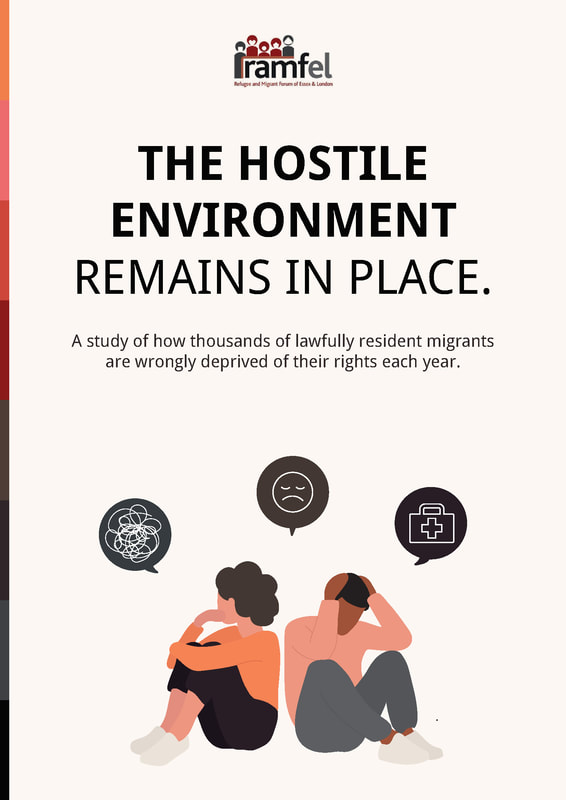The Hostile Environment Remains in Place
A study of how thousands of lawfully resident migrants are wrongly deprived of their rights each year
|
File type: PDF
File Size: 2.47 MB
Our report, The Hostile Environment Remains in Place, explores how potentially tens of thousands of lawfully resident migrants in the UK are wrongly being suspended from work, seeing benefits wrongly curtailed and being denied access too other basic state and non-state services due to spending periods in the country without a physical visa document. This is through no fault of their own, but rather a result of the systems put in place by the government and the ongoing existence of its “hostile environment”.
This comes a decade after the coalition government overhauled the way foreign nationals apply for and secure leave to remain based on their family and private life in the UK. This overhaul led to far more prescriptive rules, less discretion for Home Office decision-makers, longer waiting periods before securing indefinite leave to remain and more applications for further leave to remain. Most damagingly, the 10-year route to settlement was introduced. In 2014, the government formally introduced its hostile environment. The expansion of this scheme has steadily made the UK less hospitable for migrants, and seen more officials and bodies, from doctors to schools, effectively become de facto immigration gatekeepers. Following national outrage at the “Windrush scandal”, which saw British nationals who had lived in the UK for decades stripped of basis rights essentially because they were non-white, the government re-named the hostile environment the “compliant environment”. The apparatus remains in place though, unchanged. | |||
The Windrush scandal happened not because those impacted did not have lawful residence but because they did not hold physical documentation. This is the exact situation facing those who are lawfully resident in the UK on what is called “3C leave”, a temporary form of status issued whilst a person renews their leave to remain.
Since 2020, RAMFEL have monitored how clients on 3C leave have suffered due to having no formal visa documentation. In around a third of our cases, clients have suffered detriment, whilst in at least 17% of our cases, clients have suffered serious detriment such as being wrongly suspended from work, wrongly denied access to employment or having benefits suspended. If these trends are replicated nationwide, and we suspect they are, then we estimate that around 63,000 people per year on 3C leave could be suffering serious detriment with 40,000 or more people seeing their employment wrongly suspended or terminated. Things have gotten worse in 2022 due to increased visa waiting times and the Home Office’s failure to respond to employment verification checks in a timely manner.
It is clear that the current system is not fit for purpose if tens of thousands of lawfully resident migrants are wrongly suffering each year at the hands of the government’s current policies.
This report sets out our findings and makes 4 recommendations that the government should consider if they wish to ensure that lawfully resident migrants do not continue being denied and stripped of their basic rights. Ultimately, there is a decision for the government to make. Does it wish for tens of thousands of lawfully resident migrants to suffer each year and be wrongly denied the right to work under the pretense that this somehow prevents a far smaller number of migrants without valid status from working? If not, then it is clear that the government must dismantle and scrap its hostile environment, which has been shown repeatedly to not distinguish between undocumented migrants with or without valid immigration status.
Our recommendations
1. Remove the duty on employers to confirm a person’s right to work
This could be immediately introduced by the Home Office simply improving the information an FLR applicant receives when their application is acknowledged. As detailed, presently applicants receive an email confirming the date the application was submitted, but saying nothing about the person’s ongoing rights and 3C status.
The Home Office should introduce an automated email confirming the applicant’s status on 3C leave and their ongoing right to work and, if relevant, claim public funds whilst their FLR application is processed. This would ensure that applicants had some form of confirmation of their rights whilst on 3C leave, and would also remove the need for employers to complete the ECS verification process.
This step would see far fewer people on 3C leave wrongly suspended from or denied employment, as their employers would be satisfied of their right to employ them. It would also remove the burden on employers to proactively confirm a person’s right to work, reducing the number of ECS verifications sought, in turn saving the Home Office valuable resources.
2. Provide comprehensive training to the DWP on 3C leave and the ongoing right to claim benefits
All too often, staff at the Department of Work and Pensions simply do not understand what 3C leave is, far less a person’s rights to continue receiving benefits whilst on this temporary status.
The Home Office providing full training to their colleagues at DWP should instill the knowledge needed for DWP staff members to ensure that those on 3C leave do not wrongly see their benefits suspended/refused. This will encourage a cultural shift that sees DWP assuming that those renewing their leave to remain will retain their existing rights until proven otherwise.
3. Reduce the 10-year period required for settlement or increase visa lengths
The introduction of the 10-year route to settlement has seen more people renewing visas more frequently, in turn increasing the number of people on 3C leave. This could easily be reduced by reducing the 10-year period to 5-years. People would then only need to serve a 5-year probationary period before qualifying for ILR, meaning they would only renew their visas once and would spend far fewer periods of time on 3C leave.
If the government is unwilling to reduce the 10-year period, then visa lengths should be increased from 30 to 60 months. This would see people only needing to renew their visas once before qualifying for ILR, again reducing the periods of time people spend on 3C leave.
4. Remove the hostile environment provisions that lead to those without proof of their status repeatedly suffering discrimination
Ultimately, all of the previous recommendations will reduce the risk of those on 3C leave being wrongly denied their rights. However, whilst the hostile environment remains in place, it is inevitable that lawfully resident migrants will continue to suffer whenever they do not hold a physical immigration status document, which is currently inevitable whilst on 3C leave.
Nothing less than scrapping the whole apparatus of the hostile environment will fix this problem, but a first step would be to repeal sections 34 and 35 of the Immigration Act 2016, which greatly expanded the scope for penalizing those found guilty of the offence of illegal working and expanded the penalties for employers hiring such people.
Since 2020, RAMFEL have monitored how clients on 3C leave have suffered due to having no formal visa documentation. In around a third of our cases, clients have suffered detriment, whilst in at least 17% of our cases, clients have suffered serious detriment such as being wrongly suspended from work, wrongly denied access to employment or having benefits suspended. If these trends are replicated nationwide, and we suspect they are, then we estimate that around 63,000 people per year on 3C leave could be suffering serious detriment with 40,000 or more people seeing their employment wrongly suspended or terminated. Things have gotten worse in 2022 due to increased visa waiting times and the Home Office’s failure to respond to employment verification checks in a timely manner.
It is clear that the current system is not fit for purpose if tens of thousands of lawfully resident migrants are wrongly suffering each year at the hands of the government’s current policies.
This report sets out our findings and makes 4 recommendations that the government should consider if they wish to ensure that lawfully resident migrants do not continue being denied and stripped of their basic rights. Ultimately, there is a decision for the government to make. Does it wish for tens of thousands of lawfully resident migrants to suffer each year and be wrongly denied the right to work under the pretense that this somehow prevents a far smaller number of migrants without valid status from working? If not, then it is clear that the government must dismantle and scrap its hostile environment, which has been shown repeatedly to not distinguish between undocumented migrants with or without valid immigration status.
Our recommendations
1. Remove the duty on employers to confirm a person’s right to work
This could be immediately introduced by the Home Office simply improving the information an FLR applicant receives when their application is acknowledged. As detailed, presently applicants receive an email confirming the date the application was submitted, but saying nothing about the person’s ongoing rights and 3C status.
The Home Office should introduce an automated email confirming the applicant’s status on 3C leave and their ongoing right to work and, if relevant, claim public funds whilst their FLR application is processed. This would ensure that applicants had some form of confirmation of their rights whilst on 3C leave, and would also remove the need for employers to complete the ECS verification process.
This step would see far fewer people on 3C leave wrongly suspended from or denied employment, as their employers would be satisfied of their right to employ them. It would also remove the burden on employers to proactively confirm a person’s right to work, reducing the number of ECS verifications sought, in turn saving the Home Office valuable resources.
2. Provide comprehensive training to the DWP on 3C leave and the ongoing right to claim benefits
All too often, staff at the Department of Work and Pensions simply do not understand what 3C leave is, far less a person’s rights to continue receiving benefits whilst on this temporary status.
The Home Office providing full training to their colleagues at DWP should instill the knowledge needed for DWP staff members to ensure that those on 3C leave do not wrongly see their benefits suspended/refused. This will encourage a cultural shift that sees DWP assuming that those renewing their leave to remain will retain their existing rights until proven otherwise.
3. Reduce the 10-year period required for settlement or increase visa lengths
The introduction of the 10-year route to settlement has seen more people renewing visas more frequently, in turn increasing the number of people on 3C leave. This could easily be reduced by reducing the 10-year period to 5-years. People would then only need to serve a 5-year probationary period before qualifying for ILR, meaning they would only renew their visas once and would spend far fewer periods of time on 3C leave.
If the government is unwilling to reduce the 10-year period, then visa lengths should be increased from 30 to 60 months. This would see people only needing to renew their visas once before qualifying for ILR, again reducing the periods of time people spend on 3C leave.
4. Remove the hostile environment provisions that lead to those without proof of their status repeatedly suffering discrimination
Ultimately, all of the previous recommendations will reduce the risk of those on 3C leave being wrongly denied their rights. However, whilst the hostile environment remains in place, it is inevitable that lawfully resident migrants will continue to suffer whenever they do not hold a physical immigration status document, which is currently inevitable whilst on 3C leave.
Nothing less than scrapping the whole apparatus of the hostile environment will fix this problem, but a first step would be to repeal sections 34 and 35 of the Immigration Act 2016, which greatly expanded the scope for penalizing those found guilty of the offence of illegal working and expanded the penalties for employers hiring such people.


